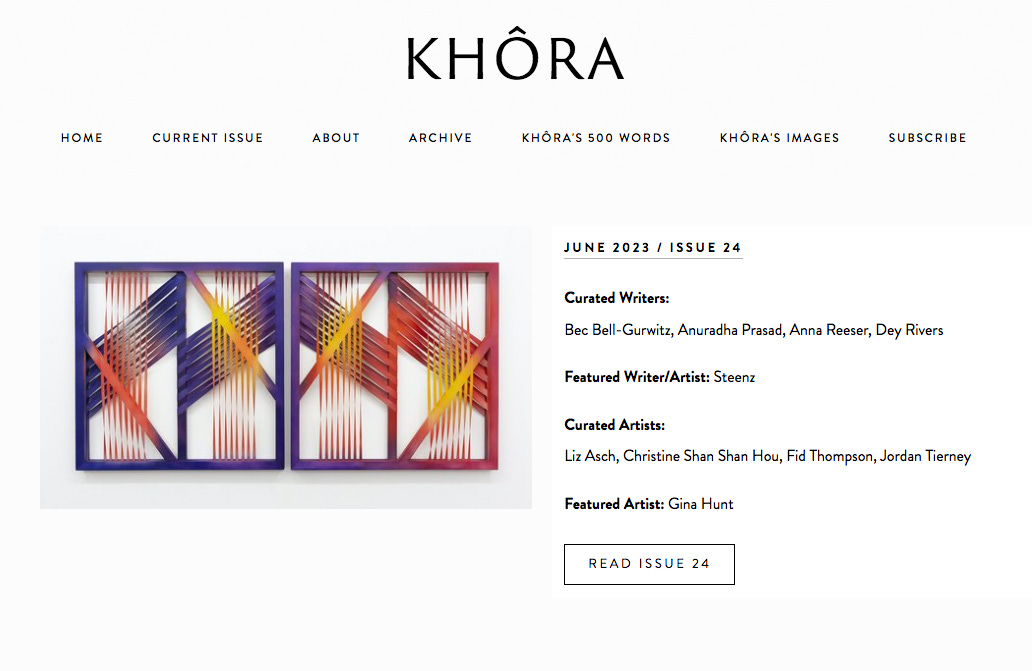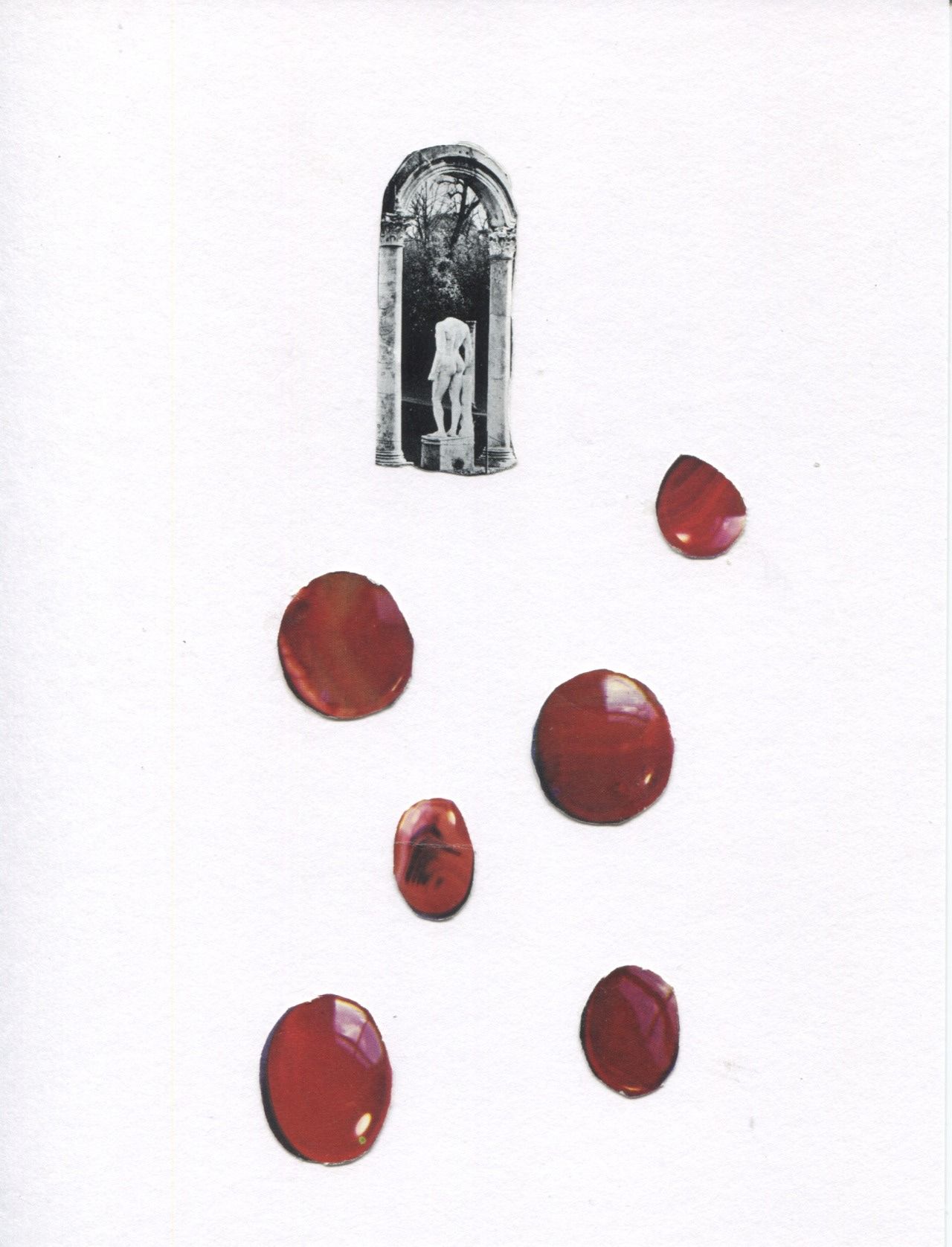Issue 24: Cairn | Waterbody | Three Lessons in Grief | Summer Song III
"They do not take gender studies. Instead, they follow reports of how many queer and trans people are murdered, how many Black people are murdered, how many Indigenous women are murdered..."
Welcome to Khôra, a dynamic online arts space produced in collaboration with Lidia Yuknavitch’s Corporeal Writing. Visit our Archive to read previous issues.
As promised, we’re back today with Issue 24 highlights from our curated team of writers Bec Bell-Gurwitz, Anuradha Prasad, Anna Reeser, and Dey Rivers; and artists Liz Asch, Christine Shan Shan Hou, Fid Thompson, and Jordan Tierney.
Anuradha Prasad is a writer living in Bangalore, India. She holds a Master’s degree in English Literature. She writes short fiction, essays, and poetry. Her work has appeared in Sleet Magazine, Literally Stories, The Bangalore Review, Borderless Journal, Muse India, and Usawa Literary Review.
Christine Shan Shan Hou is a poet and artist of Hakka Chinese descent. Their publications include The Joy and Terror are Both in the Swallowing (After Hours Editions 2021), Community Garden for Lonely Girls (Gramma Poetry 2017), and “I'm Sunlight” (The Song Cave 2016). Their artwork has been exhibited at White Columns and Deli Gallery in New York City.
Cairn by Anuradha Prasad | artwork by Christine Shan Shan Hou
Myra believed in mornings. They showed up. This morning showed up with a boulder. It pinned her down. She clutched her key charm, a talisman of jagged edges rescued from her mother’s antique store, in panic.
It had been an unusual day at school those many years ago. As her teacher praised her, she felt like an outline that was being filled with color. From a chameleon-like creature to a bird of paradise—it was a transition. At dinner, she wanted to tell her mother how well she did in class. Nervous, she stabbed the vegetables on her plate. Mauna, who had been moving like a tightly coiled serpent, uncoiled, grabbed the fork out of her hand, and holding it over her like a trident, asked, you want me to feed you now, is it?
Read Cairn.
Dey Rivers is a non-binary Black american navigating mental health challenges, playing in fictional worlds and poetry, painting and collective dreaming where they reside on stolen land. Their work is based on Sankofa, in conversation with the past and present to imagine futures. They have an educational background in Fine Arts and mental health advocacy, and were selected for the 2020 Ooligan Press Writers of Color Showcase. Dey is currently revising a queer historical novel.
Fid Thompson is an artist, writer, gardener, wonderer, queer white human who grew up in rural England. Her art is informed by her bi-cultural family and the humans, cultures, creatures, plants, and landscapes of the places where she has lived. Her work inquires into inner and outer worlds and weathers, nature, mental health cycles, and portraiture of all the kinds. Fid has twice been a recipient of the DC Commission on the Arts and Humanities’ Fellowship, including for her Queer Enough portrait project, and is a 2023 grantee of the Washington Project for the Arts's Wherewithal grant. She is currently writing about worms, among other things.
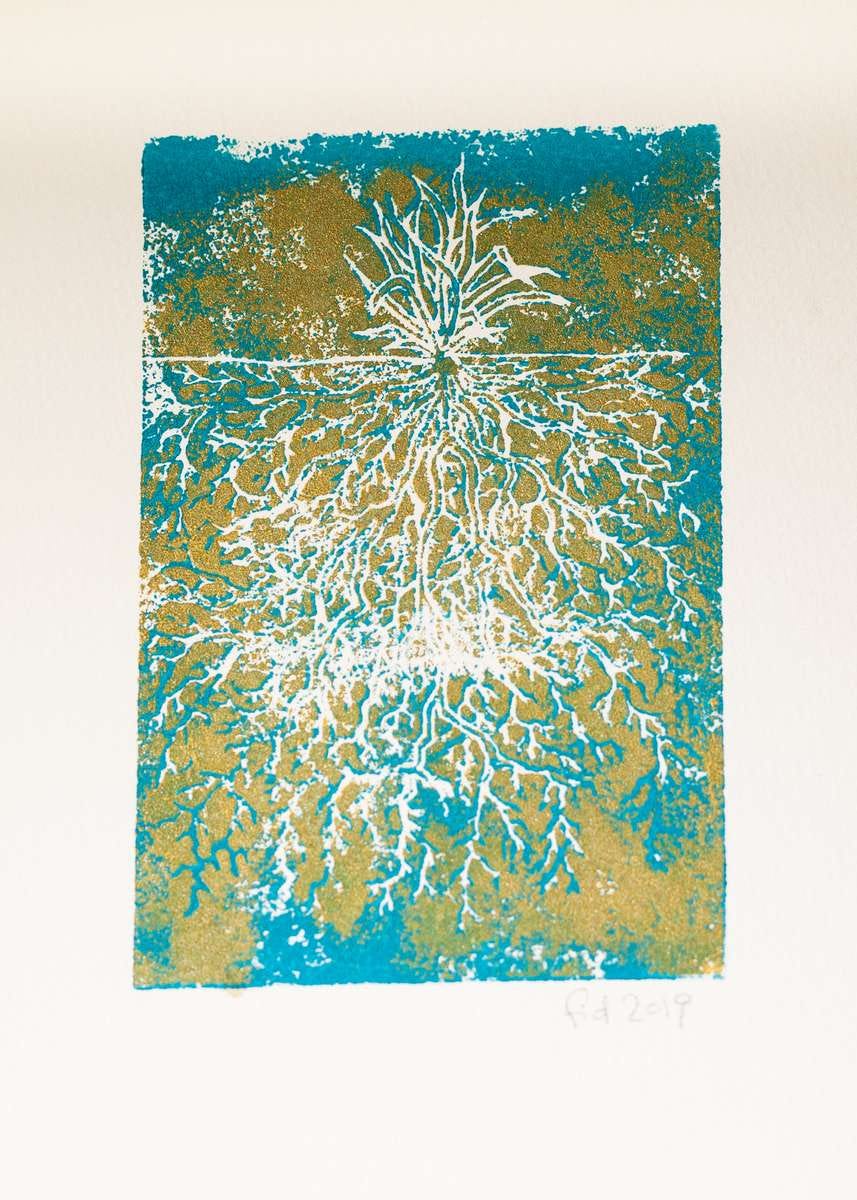
Waterbody by Dey Rivers | artwork by Fid Thompson
Oh, the questions they used to have. Still have. May never be answered in fullness. How does one flow in a new timeline as a light-skinned Black person with a deeply gendered childhood in the nineties and aughts?
A young life pushing against the dam holding them in place. Wearing dresses and climbing ladders, roofs, monkey bars, jumping on and off merry-go-rounds, feeling deeply they could be a boy, stronger than a boy, pass as a boy and often quietly tried. In pretend play they were a boy, pulling on baseball caps, taking the “boys” role in learning dance steps. They also wanted to dance the “girls” role, too. Once, they declared they wanted to be a hermaphrodite (knowing the term but not recalling how). Everyone pulled disgusted faces and said they were weird. Those kids didn’t play with them anymore...
Read Waterbody.
Bec Bell-Gurwitz is a writer living in Northampton, MA, on unceded Pocumtuck land. Their work appears in the anthology Strange Attractors: Lives Changed by Chance, The West Trade Review, The Citron Review, Thrice Fiction, and others. Bec won Writing by Writers’ 2022 San Juan Residency, is a 2021 Pushcart Prize nominee, and placed as a finalist for The Southwest Review's Meyerson Fiction Prize. Bec is currently an MFA candidate in prose and teaching associate at the University of Massachusetts-Amherst.
Jordan Tierney lives and works in Baltimore, MD. Always an artist, she has also worked as an illustrator, building renovator, gallery owner, and museum exhibit fabricator. Her artwork has always been the result of intimate knowledge of the terrain she walks. She worries about climate collapse, and especially her daughter’s future. She is awed by the abused urban streams and forest buffers of Baltimore City. The beings struggling to survive there inspire her to use her skills and a little sorcery to change the valence of trash she collects from negative to positive. This process of observing nature, collecting trash, and making visual poetry has become a spiritual practice. Her sculptures are objects a shaman of the future might create to speak of the mysteries of the universe. She enjoys the resourcefulness of working with what she can find. Each piece is a manifestation of many days of labor. This kind of devotion only happens when we love something. Jordan loves this planet and is grateful for the places where her feet touch the ground here.
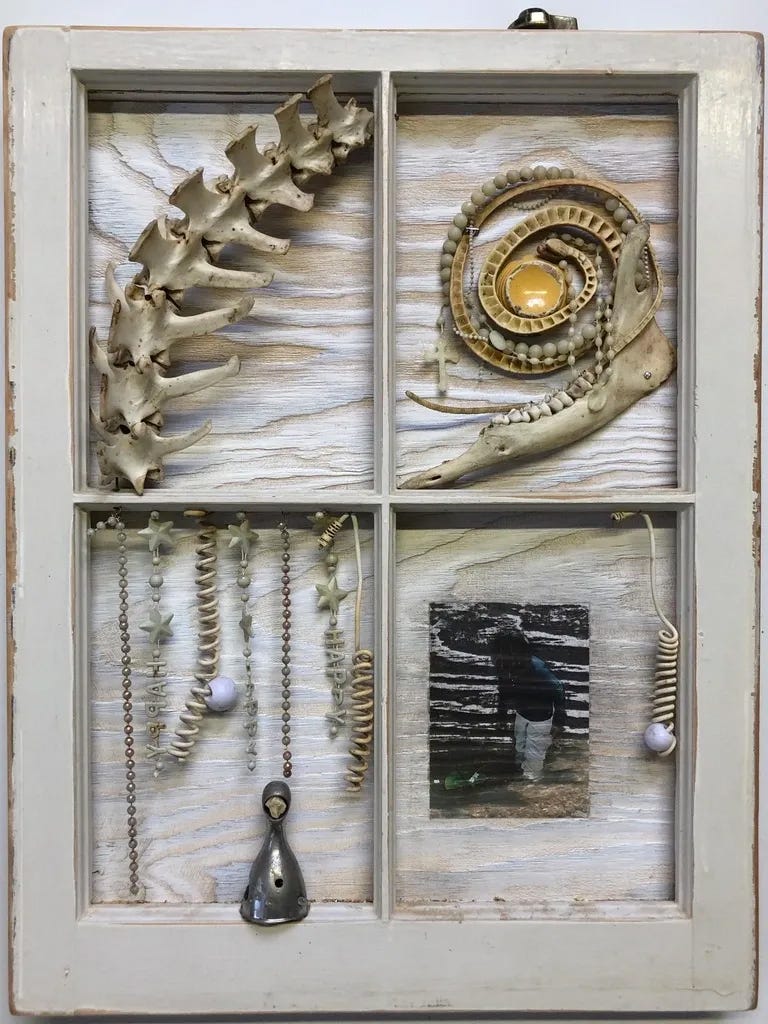
Three Lessons in Grief by Bec Bell-Gurwitz | artwork by Jordan Tierney
Upbringing
The first lesson was how to keep things alive,
how to water the plants, to raise silk
the class caterpillars died a slow protracted death,
left their silk behind
this is how I learned we are
what we makeOn a family trip I didn’t want to face depths or
ride listless burros,
anything that could take me down
Read Three Lessons in Grief.
Anna Reeser’s short fiction is published in The Best American Short Stories 2020, The Masters Review, Fourteen Hills, and CutBank. She has lived throughout the West Coast and is now based in her hometown of Ojai, California. She recently completed a story collection and is working on a novel.
Liz Asch is an author, artist, and acupuncturist based in Portland, Oregon. Her book, Your Salt on My Lips (Cleis Press, 2021), is an ode to eros in queer bodies of the global majority. Her podcast, Body Land Metaphor Medicine, is a free archive of somatic visualizations. Her stop-motion animation film, The Love Seat, played in LGBT film festivals in the US and Canada. Liz holds a BA from Vassar, a Masters in Chinese Medicine, and an MFA in Creative Nonfiction from Eastern Oregon University. Liz has published essays, poems, interviews, stories, book reviews, and artwork in a variety of journals and anthologies, earning her a Pushcart nomination, a RACC grant, and several essay prizes. Liz teaches embodied surrealism and salutary storytelling, with an emphasis on earth activism, creative expression, and public health.
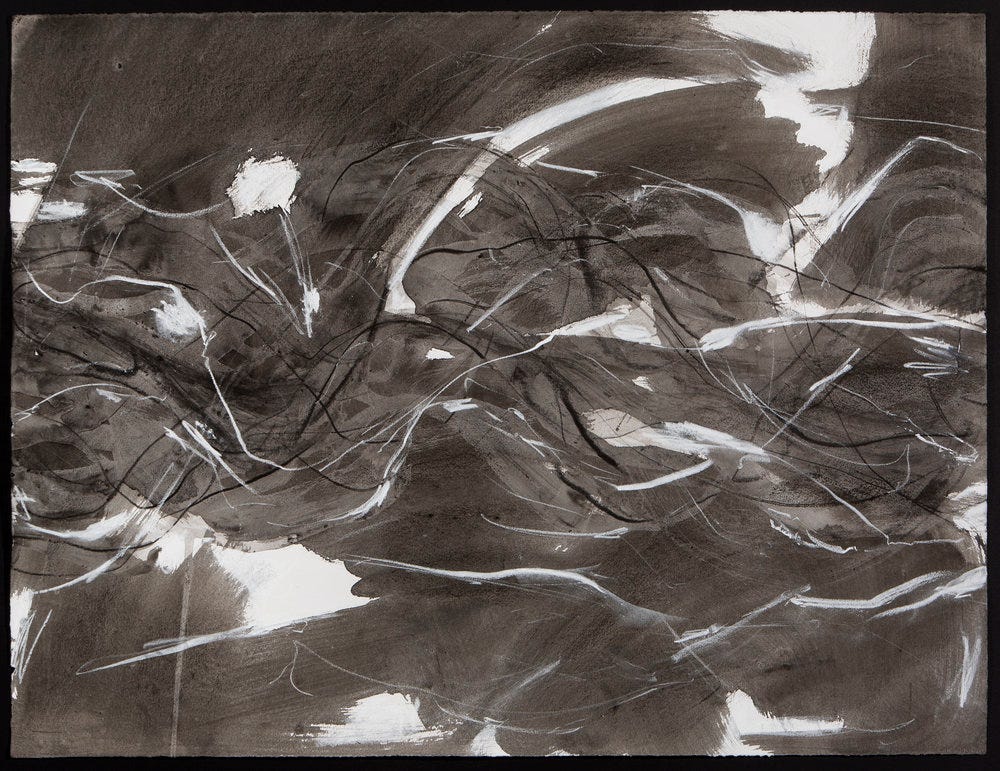
Summer Song III by Anna Reeser | artwork by Liz Ash
We made it to Eastern Oregon in the late afternoon. There was the road—two lines angled to meet at a horizon. Landscape like a three-color print: rust red, ochre, faded denim blue. In the backseat: water bottles, a bag of almonds, a pile of towels. Aaron’s hand gripped the wheel too hard. My bare feet tucked under the gingham sundress, waiting for the blood. The ultrasound image appeared if I closed my eyes—the debris—so I stared out the window. Even as we sped southeast, the world seemed completely still. Every so often, a wind-battered house cast a square shadow. One had a white lawn chair baking in the sun.
My mother called. I hesitated before picking up.
“I’m taking a pottery class,” she said when I answered. “I know. Silly. But something got me thinking, your good news, maybe—and Cheryl was teaching one at the community center, and so—why not? I thought it might be satisfying. So—isn’t the ultrasound soon? Any nausea today?”
“No nausea. Sorry, I have to go.” I heard my voice, metallic and strained…
Read Summer Song III.
Some NEWS!
We’re currently selecting our next curated team. Artists and Writers, please send us your work! To enter Khôra’s collaborative waters:
Writers, read about Khôra’s 500 Words here.
Artists, send your artwork to Khôra's Images here.
If you love what you’re seeing, please subscribe, share, tweet, retweet, and post, and Khôra will be back next month.
With galactic gratitude,
Leigh
Leigh Hopkins
and the Corporeal/Khôra squad
As a reminder, when you subscribe to Khôra for free, you’ll receive issue highlights straight to your inbox. No one will be turned away due to lack of funds. If you are able to pay for a subscription, we love you, and you help to build access for others. If you’re not able to pay for a subscription, we love you, and welcome to the revolution.




